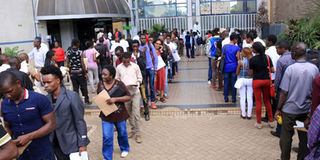Bid to change Helb law in favour of poorest areas flops

Students and parents return loan application forms to the Higher Education Loans Board offices in Nairobi on September 30, 2016. PHOTO | FILE | NATION MEDIA GROUP
What you need to know:
- Section six of the Helb Act further empowers the board to receive and consider all loan applications from eligible persons or students.
- Through the Means Test Instrument, the ministry said applicants from marginalised areas access financial support.
Parliament has stopped efforts to change the Higher Education Loans Board (Helb) Act to make it mandatory for the government to give loans to all students from marginalised areas.
Lamu Woman Representative Ruweida Mohamed was seeking to amend Section 6 of the Helb Act to compel the state agency to advance loans to all students from marginalised areas.
Had the amendments been passed by the House, Helb would have been compelled to award bursaries and scholarships to all eligible students from marginalised areas.
AWARD BURSARIES
Paragraph six of the functions of the board states that it “shall establish and award bursaries and scholarships which it may consider necessary for the promotion of the objectives and its functions.”
Section six of the Helb Act further empowers the board to receive and consider all loan applications from eligible persons or students wishing to be considered for the award of the loans and to approve, withhold or reject such requests.
However, the National Assembly Committee on Education said in a report that it cannot be possible to award loans, bursaries and scholarships to all students from marginalised due to limited financial resources.
ELIGIBLE APPLICANTS
The committee, chaired by Tinderet MP Julius Melly, expressed reservations on the amendments pointing out that if Helb was to go down that route, then it will not be fulfilling its main objective of funding eligible applicants regardless of their geographical background.
“Not all students from marginalised areas are needy as some of the parents can afford to pay fees. On the contrary, there are needy students from other areas...who deserve to be considered for Helb loans and bursaries,” reads the committee report.
The committee also warned that, if adopted, the amendments may set a precedent to change other laws towards favouring people from marginalised areas at the expense of other Kenyans.
“The bursaries from the National Government Constituencies Development Fund (NG-CDF), National Government Affirmative Action Fund (NG-AAF), the Equalisation Fund and other funds disbursed to marginalised areas may be used to supplement Helb loans,” reads the report.
CLASSIFY COUNTIES
“The committee rejects the amendment to section six of the Higher Education Loans Board as proposed in the bill,” the report further says.
The Commission of Revenue Allocation currently classify the following counties as marginalised: Tana River, Lamu, Isiolo, Turkana, Samburu, Marsabit, West Pokot, Kajiado, Narok, Marakwet, Garissa, Wajir and Mandera, Kilifi Kwale, Taita Taveta and Kitui.
In its submission to the committee, the Ministry of Education pointed out that the amendment is intended to single out marginalised students in the award of loans, bursaries and scholarships by Helb.
DISCRIMINATION
“The proposed amendment may amount to discrimination because there are (deserving) learners who...may not be necessarily be from marginalised counties,” it said, adding that there are appropriate measures that ensure marginalised areas are catered for.
Through the Means Test Instrument, the ministry said applicants from marginalised areas access financial support. The committee now wants the MP to withdraw the Bill and, if scheduled by the House Business Committee to come up for second reading, then it should be rejected.




